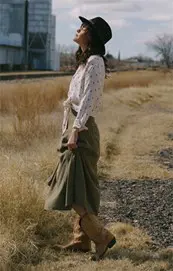Potential for Permanence: An Interview with Erin Rose Belair
By Sarah Doan

Sarah Doan: Thank you for agreeing to take part in this interview! First, I’d like to hear about your start as a writer. When did you first realize you wanted to become a writer? What drew you to writing?
Erin Rose Belair: I started writing in high school, probably for the same reasons I write now: to make sense of the world and understand who I am at the current. I wrote poetry in high school, and I had an incredible teacher who encouraged me and introduced the idea that I could be a writer. She allowed me, my senior year, to submit a book of poetry for a self-designed course credit and I won an award for it. I was also listening to a lot of Dessa at the time. She is a spoken word artist, writer, and MC from Minneapolis where I grew up. I remember distinctly seeing her perform and understanding for the first time how multi-dimensional I could be as a woman. She was beautiful and intelligent, and her words cut right through. She was a massive inspiration in shaping my concept of who I wanted to be.
What drew me to it? Perhaps the potential for permanence. I’ve been preoccupied my whole life with nostalgia and times gone by. Photography was one of my first loves for the same reason. I’ve always felt the need to create and capture the now and save it for later.
SD: According to your website, fiction is not the only form of writing you engage in. You also write travel essays based on the places in which you end up on your adventures, and you complete copywriting tasks for various brands. How do you think your experience as a creative writer plays into your skills as both a travel writer and a copywriter? What skills related to creative writing do you feel have been most beneficial in your professional writing career?
ERB: I have never prescribed much to any one genre. I think all the work feeds the same beast. Travel writing makes me a better fiction writer. Fiction writing makes me a better copywriter. The more you write, the better you get: and I was lucky to find a way to both work on my fiction and make a living while remaining in my writer brain. I also teach writing workshops and am super blessed to spend my life interacting with writers on the daily.
I do think voice is the strongest skill that relates to all of the work. Finding the right voice is key, and I do think it’s a strong suit of mine that comes particularly from fiction writing and creating characters.
SD: Out of curiosity, what kind of writing do you enjoy the most out of the genres you participate in? Out of those, do you feel there’s one that suits you the best? Or do you enjoy all of them equally?
ERB: My fiction is my life’s work. This is what I would like to do more than anything and what I will never give up. Copywriting is more of a trade that fuels my adventures, and travel writing is the product of me digesting and experiencing the world. I love nonfiction and have fallen deeply for the lyrical essay in the past few years. I have an essay collection coming out this year and if I had to guess, I might be best in this regard. But, fiction is my one true love.
SD: Now, I’d like to ask you about your piece in the spring 2022 Southern Indiana Review, “Just Details.” What inspired this short story? Was there a certain moment or experience in your life related to the story’s content that inspired you, or did the concept just pop up?
ERB: Both. I very much write short stories in a let’s see where this takes us kind of mood. I never plan out a story, and yet, they are nearly always germinated from something I cannot seem to let go of. I had the opening line of this story, “In June the boxelder bugs get stuck between the window panes…” in my notes for years (no joke, like six years), knowing it was the start of a story. I was at a house party in Utah and in between the window panes were box elder bugs, and it was June. I don’t know if they died there, but in my head they sure did.
There is also the scene later with the robbery, and all of that is near true. I witnessed a robbery as a child that happened much like this, and I borrowed the details for this story. All of that really happened, everything from the bike helmet to the jeep at the golf course.
SD: In “Just Details,” although the main character’s husband, grandmother, and grandmother’s caretaker are given names, the main character herself is not, nor are any of the other people she meets in town. How do you think this anonymity, combined with the utilized first-person point of view, emphasizes the main character’s desire to free herself from the boredom of her life before her grandmother’s death?
ERB: You know, I’ve done this before and I don’t know why. I wish I had a smart answer, but it’s just a thing I do. I rarely name immediate characters, and yet people on the periphery get names, perhaps because they don’t get as much detail or dialogue and we have to identify them in some quick way. The more immediate characters get mannerisms and other identifiers that feel truer to life, and names feel like an afterthought. Names don’t tell you much about a person.
SD: The story begins with the mention of boxelder bugs living (and dying) in the window panes of the main character’s grandmother’s house. Although boxelder bugs can have life spans up to one year old in real life, they always (in the story) end up dying in the window panes after becoming stuck. Do you feel the main character finds herself relating to the boxelder bugs, even though their ultimate fate contrasts with the freedom she feels while choosing to remain in her grandmother’s house? If so, how? If not, why do you think their presence stands out to her so much?
ERB: You know the bugs came first in this story, so I am sure on some subconscious level that imagery is what created the main character and her situation for me, but I assure you it was not a conscious choice. Like I mentioned earlier, this line about the bugs was rattling around for some time and when I finally wrote the story, it was a question of who sees these bugs and then what kind of state someone is in where these dead and dying bugs would be noticed and have an impact on them. She is living in a very insulated moment in her life; she doesn’t have much around her. Things are complicated and yet also incredibly simple at the same time for her. If I were analyzing my own story, I’d say yes, she relates to them, but in the end chooses a different fate. The trapped space in her life is not the house, like the bugs, but rather her old life; perhaps she sees herself in her old life through those same window panes. But again, this is all in hindsight. I didn’t write the story thinking that.
SD: In the big picture, what aspects of “Just Details” do you feel reflect your style or approach as a writer? It is often the case that writers gravitate toward some of the same general topics and images when creating a work, whether they are aware of it or not. What parts of “Just Details” do you feel are representative of your authorial “fingerprint”?
ERB: I went back and looked at my stories to answer this question and it was really fun. So I’d say yes, it feels like a very me story: young woman at a crossroads. I’m really interested in those moments in life in which we take a new path because they often are not grand moments at all. We make huge life altering choices on totally innocuous days and this is where a lot of my stories take place.
Also, the food in this story. The writing about it and the presence of it is something that has become more and more present in my writing, and I wanted to highlight that here and allow it to actually become essential to the narrative. I would be curious what someone else who has read my work would say, and what part of this story has my fingerprint.
SD: Lastly, I’d like to briefly ask you about your goals as a creative writer. Writing is often done not only for oneself, but also for one’s audience. What do you hope your audience takes away from your writing, either in the case of “Just Details” or in general?
ERB: My goal for writing remains the same as it always has been and always will be: to never stop. I hope, regardless of the outcome, I spend my life writing. This to me is the hallmark of a writer. I am beyond grateful to have any audience at all, and I hope someone who reads my work might recognize themselves in it or take some granule of truth that helps them process their own life. I hope someone is entertained by my stories and gets lost for a moment. I hope other writers feel inspired by a character or a turn of phrase. And I hope all of my stories outlive me.
Erin Rose Belair received her MFA at Boise State University, where she wrote her first collection of short stories, Vinegar. Stories from this collection have won awards and been published with Glimmer Train, Narrative, Greensboro Review, Juked, and more. She just finished her first novel, The Only Road Home. Belair lives and writes in Laguna Beach, California.
